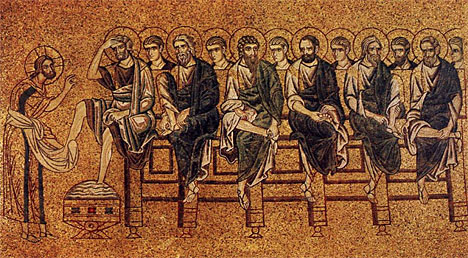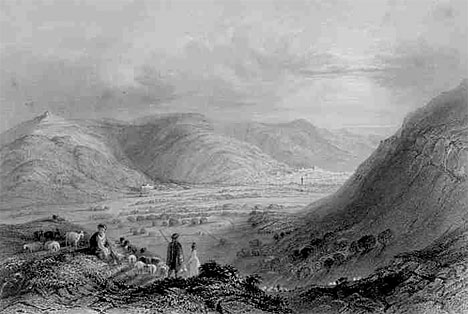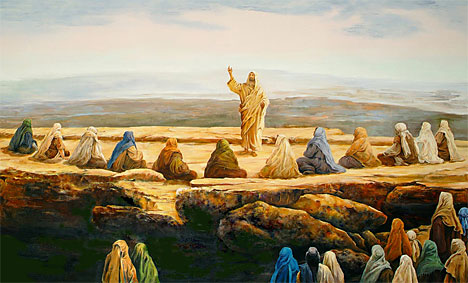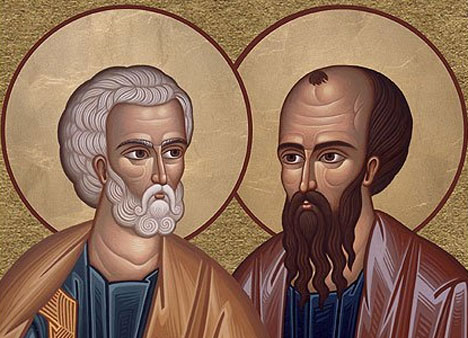Nov
16
2013

How to Fulfill the Law
“…men are enthroned as elohim (judicial ‘gods’) but not as God intended. Those who sit in the seat of Moses often lack his meekness before God, and their rule is like that of Lamech. Their seventy times seven ‘fulfilling of the Law’ is vengeance not forgiveness.”
We continue with the Deuteronomy section of Galatians, which has seven cycles. Paul moves from an Ascension/Firstfruits motif to an Testing/Pentecost motif. Being the center of this final group of cycles, and at the center of its Ethics cycles, here we have its turning point. The first half of this cycle is about sacrificial binding. The last half is about being loosed on account of the sacrifice.
Continue reading
Comments Off | tags: Galatians, Literary Structure, Paul | posted in Bible Matrix, Biblical Theology, Christian Life, Ethics
Oct
18
2013

Paul’s Deuteronomy
That day Moses charged the people, saying, “When you have crossed over the Jordan, these shall stand on Mount Gerizim to bless the people: Simeon, Levi, Judah, Issachar, Joseph, and Benjamin. And these shall stand on Mount Ebal for the curse: Reuben, Gad, Asher, Zebulun, Dan, and Naphtali. (Deuteronomy 27:11-13)
Paul now moves into the Deuteronomy section of his epistle to the Galatians, and it becomes clear that, structurally-speaking, Galatians gets no further than Moses. The epistle is fivefold in nature, a recapitulation of the Torah, and thus it ends on the wilderness side of the Jordan. Like Moses, Paul will not live to see the new order, except from afar.
Continue reading
Comments Off | tags: Baptism, Circumcision, Covenant curse, Deuteronomy, Galatians, Literary Structure, Moses, Paul | posted in Bible Matrix, Biblical Theology, Ethics, The Last Days
Oct
12
2013

And he opened his mouth and taught them, saying: “Blessed… Blessed…”
(Matthew 5:2-11)
Part 1 is here.
From the mouth of God, (Initiation)
Adam received a natural breath (Delegation)
that he might tend to natural things. (Presentation – priesthood)
He then received spiritual words (the Law). (Purification – kinghood)
He was to repeat these spiritual words (Transformation – prophethood)
that he might receive spiritual (ethical) breath (Vindication)
and become himself the source of spiritual words. (Representation)
Continue reading
Comments Off | tags: Abraham, AD70, Baptism, Covenant Creationism, Covenant Theology, Gensis, Literary Structure, Noah, Sermon on the Mount, Tabernacle of David | posted in Against Hyperpreterism, Bible Matrix, Biblical Theology, Ethics
Sep
8
2013

“Whoever sheds the blood of man,
by man shall his blood be shed,
for God made man in his own image.”
(Genesis 9:6)
James Jordan’s contribution to the study of any particular book of the Bible is invaluable, but the most important is very likely his work on Genesis. Because spineless modern theologians are unwilling to stand for its complete veracity, and yet very willing to jettison basic logic, they often miss the significance of its early chapters for the rest of the Bible and of history.
Continue reading
Comments Off | tags: cherubim, Genesis, James Jordan, Noah, Psalms, Seraphim | posted in Bible Matrix, Biblical Theology, Ethics, The Last Days
Aug
2
2013

Paul’s Leviticus
“This is where he picks up the fivefold Covenant structure and turns ‘the right hand of fellowship’ into a set of holy knuckledusters.”
This post has been refined by fire and included in a new book, The Shape of Galatians.
Continue reading
Comments Off | tags: Circumcision, Food laws, Galatians, Hebrews, Leviticus, Literary Structure, Moses, Paul | posted in Bible Matrix, Biblical Theology, Ethics, The Last Days
Jul
16
2013
 “When Moses slew the Egyptian, he was doing the will of God but not with the power of God.”
“When Moses slew the Egyptian, he was doing the will of God but not with the power of God.”
Numbers 12:3 says that Moses was the meekest man “on the face of the ground [adamah].”
Psalm 37:11 says the meek will inherit the Land [eretz] and delight in abundant prosperity.
Isaiah 11:4 says that
with righteousness [God] shall judge the poor,
and decide with equity for the meek of the Land;
and he shall strike the Land with the rod of his mouth,
and with the breath of his lips she shall kill the wicked.
Firstly, what is meekness? And secondly, why is it connected to “face of the ground” (Adam), or Land?
This post has been slain and resurrected for inclusion in my 2015 book of essays, Inquietude.
Continue reading
Comments Off | tags: Ascension, Firstfruits, Genesis, Herod, Isaiah, James Jordan, Matthew, Moses, Pharaoh, Tabernacle | posted in Bible Matrix, Biblical Theology, Christian Life, Ethics, Quotes, The Last Days
Jun
27
2013

So I find it to be a law that when I want to do right, evil lies close at hand. For I delight in the law of God, in my inner being, but I see in my members another law waging war against the law of my mind and making me captive to the law of sin that dwells in my members. (Romans 7:21-23)
Interpreters debate the meaning of Paul’s words in Romans 7:14-25. Are we to apply these statements to a Christian or a non-Christian? Could a Christian utter these words? Perhaps a better question is, are these the words of an unregenerate man?
Continue reading
Comments Off | tags: Numbers, Paul, Romans | posted in Biblical Theology, Christian Life, Ethics, The Last Days
May
30
2013

or The Murderess of Modernity
Joe Rigney has a great piece on the Trinity House website. With apologies to Joe, I’ll give it to you in a nutshell, then make some brief observations. But make sure you read the entire article.
Continue reading
11 comments | tags: Compromise, Culture, Esther, Genesis, Joe Rigney, Martyrdom, Mordecai, Peter Leithart | posted in Christian Life, Creation, Ethics, Quotes
May
21
2013

“Matthew understands Jesus to be the rightful heir of the chieftaincy who instead volunteers to become the Victim at the tribe’s feast. But by being the voluntary victim, he becomes the first victim in the world who can speak.”
An excerpt from Eugen Rosenstock-Huessy’s “Fruit of Lips”:
“…as oral as Peter the fisherman must have been and as much as he probably detested ink, Matthew certainly was familiar with paper work and written records, only too well. Since we do not expect him to be employed inside his old activities, where he had used writing for superficial purposes to say the least, we may expect him to fight elsewhere…”
Continue reading
Comments Off | tags: Communion, Eugen Rosenstock-Huessy, Gospels, Matthew, Sacraments | posted in Biblical Theology, Ethics, Quotes
Mar
11
2013
A very surprising, thought-provoking and edifying lecture by Edward Tingley from Augustine College.
Continue reading
Comments Off | tags: Edward Tingley | posted in Christian Life, Ethics


































